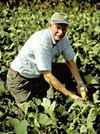Posted 7/30/2012
Harvesting Opportunities: Growing Local Food Economies and Protecting Farmland is a day-long conference sponsored by the American Farmland Trust that promises to "Inspire and Educate New Yorkers to Support Agriculture, Strengthen Local Farm and Food Economies and Get Involved in Protecting Farmland."
The event will be held on November 15th, 2012 at the Hotel Albany in downtown Albany. Download more information below.
Posted 7/26/2012
by Bonnie S. Peck

In the early 1940’s, the first antibiotic, penicillin, was used to successfully treat bacterial infections. This saved thousands of lives, including those of wounded World War II soldiers. Today, antibiotics, which target microorganisms like bacteria, fungi, and parasites, are essential for human and animal health. They continue to save lives as well as increase animal production and efficiency.
However, exploration of alternative strategies to reduce the use of antibiotics is needed due to the growing concerns about antibiotic resistance developing for certain strains of bacteria which is leading to restrictions in their use in animals. Some of the latest scientific breakthroughs and technologies, which provide new options and alternative strategies for enhancing production and improving animal health and well-being will be presented at an international symposium this coming fall. This article is a preview of some research that will be presented. “A number of the new technologies have direct applications as medical interventions for human health, but the focus of the symposium is animal production, animal health, and food safety.” Says Cyril Gay, national program leader for animal health with the Agricultural Research Service in Beltsville, MD. “The results of this symposium will be an assessment of new technologies for treating and preventing diseases of animals and recommendations that will advance strategies for growth promotion and health in livestock, poultry, and aquaculture.”
Over the years, ARS scientists have developed and patented new technologies that could aid in reducing antibiotic use. Some of those tools have been shown to be effective in treating mastitis in cattle, controlling foodborne bacterial pathogens, creating antimicrobials that kill disease-causing bacteria, and protecting poultry against parasites.
Posted 7/26/2012
by Stacey Shackford for the Cornell Chronicle Online

Our days of crying over spoiled milk could be over, thanks to Cornell food scientists.
Milk undergoes heat treatment -- pasteurization -- to kill off microbes that can cause food spoilage and disease, but certain bacterial strains can survive this heat shock as spores and cause milk to curdle in storage.
Researchers in the Milk Quality Improvement Program at Cornell's College of Agriculture and Life Sciences have identified the predominant spore-forming bacteria in milk and their unique enzyme activity, knowledge that can now be used to protect the quality and shelf life of dairy products.
"Control of food spoilage is critical in a world that needs to feed 7 billion people," said Martin Wiedmann, food science professor and study co-author. "Approximately 25 percent of post-harvest food is spoiled by microbes before it is consumed."
The study, published in the March issue of Applied Environmental Microbiology by the lab of Wiedmann and Kathryn Boor, the Ronald P. Lynch Dean of the College of Agriculture and Life Sciences, identified the predominant strains of spore-forming bacteria, which can foul milk and other food products. The culprits, Paenibacillus bacteria, are ubiquitous in nature and cause off-flavors in a variety of foods and curdling in dairy products.
Posted 7/24/2012

According to a news release from USDA, New York dairy herds produced 1,095 million pounds of milk during June. Milk cows were unchanged but production per cow was up from the previous year resulting in a 1.4 percent increase in milk production compared to June 2011. The number of milk cows averaged 610,000 head, unchanged from June of the previous year. Milk per cow averaged 1,795 pounds, up 25 pounds from the June 2011 rate.
Dairy farmers in the Empire State received an average of $16.80 per hundredweight of milk sold during June, down 50 cents from May and $5.60 less than June a year ago.
Milk production in the 23 major States during June totaled 15.5 billion pounds, up 1.0 percent from June 2011. May revised production at 16.4 billion pounds, was up 1.9 percent from May 2011. Production per cow in the 23 major States averaged 1,827 pounds for June, 7 pounds above June 2011. The number of milk cows on farms in the 23 major States was 8.51 million head, 57,000 head more than June 2011, and 14,000 head less than May 2012.
Posted 7/19/2012

SUNY Adirondack in Queensbury, NY has developed a new course called "Introduction to Sustainable Agriculture" that will begin with this fall's semester and enrollment is now open. The classes will be held on Tuesdays, 9:00-11:00 a.m. and Thursdays 9:00 a.m. - 12:00 noon. Lectures, readings, discussions, and outdoor labs in gardens, farms and orchards will all be part of the coursework.
According to a printed announcement, the course description includes: Scientific concepts of sustainability will be developed and applied to agriculture on the homestead or small farm. Using the College’s farmland, orchard and gardens, students will learn to manage crops and animals as an ecosystem, develop and analyze natural and low-energy management strategies, adapt crops to climate change, and create sound economic market plans. Hands-on fieldwork and individual research complement classroom lectures and discussions. Students interested in sustainable agriculture will transfer these skills directly into further study or work.
Download full details below.
Posted 7/17/2012
Area dairy nutritionists and dairy producer-participants in CNY's Precision Feeding Program will gain insight into a cutting-edge technique that could help reduce feed protein prices.
The Central NY Dairy & Field Crops Program will present "Taking Precision Feeding to the Next Level" on Wednesday, July 25th in Norwich, NY.
The seminar will bring the most up-to-date research-based information with speakers Dr, Chuck Schwab, Dr. Larry Chase, and Ryan J. Higgs. Dr. Schwab is a recently retired researcher on Amino Acid Nutrition in Dairy Cattle whose work is recognized worldwide. Dr. Chase is a renowned member of Cornell University's Animal Science faculty specializing in dairy nutrition. Higgs is a graduate student in protein nutrition. Learn the ins and outs of how to make lower protein rations work. Learning and applying the technology presented could bring economic benefits into the future.
For more details contact Area dairy Specialist David Balbian at drb23@cornell.edu.
Posted 7/3/2012

July 11, 2012
Join Dr. Tom Zitter and the team as we visit two Capital District farms. We will discuss diseases that we have seen this season and controls for problems that we anticipate arriving later in the summer.
Please bring your questions, and even your samples, which must be brought in sealed Zip-Loc bags!
10:00 am to 12:00 Noon— Korona Korn and Veg Farm, 1979 County Highway 107, Amsterdam, NY 12010, Fulton County. The Korona’s are dairy farmers that have transitioned into fresh market vegetables—primarily sweet corn and cucurbits, but they are diversifying rapidly.
6:00 to 8:00pm—Engel’s Acres, 445 Brunswick Road, Troy, NY 12180, Rensselaer County. Tour Ed Engels brand new farm. He and his family look forward to showcasing the farm stand.
2 NYS DEC credits are available. For more information call Chuck Bornt (518-859-6213) or Crystal Stewart (518-773-0018).
Posted 6/26/2012

Meet Abby Foster, the new research technician for CCE's Capital District Vegetable and Small Fruit Program.
As a graduate of SUNY Oneonta, Abby's academic background is in Natural Resources and Environmental Education and she says that agriculture has played a significant role in her life.
Abby grew up on a small family farm in eastern NY, not far from here. While her family's farm now raises livestock, when she was younger it was a lively vegetable and fruit producer of melons, asparagus, and had a pick-your-own strawberry business.
In addition to her own farming experience, she has worked for area farmers both in the field and at local farmers' markets.
Abby joins the current CDVSF team of Chuck Bornt, Laura McDermott and Crystal Stewart serving the research and educational needs of commerical vegetable and small fruit growers in 11 counties, including Fulton and Montgomery.
Welcome, Abby!
Posted 6/21/2012

If potato growing is new to you hilling may be a bit more of an art than a science. As tubers swell, especially if they have good moisture and adequate nutrients they will begin to push out of the soil. Hilling keeps the developing potatoes from being exposed to sun, which turns them green and bitter. Green potatoes contain a chemical, solanine, which is toxic in large amounts. This may not be as visible in dark fleshed varieties like blues but is just as dangerous.
Here are some hints for success:
-
When To Hill: When the plants are about 6 to 8 inches tall. Repeat in about 2 to 3 weeks.
-
How to Hill: Hoe soil loosely around the base of the plants to within about an inch of the lower leaves from both sides of the row. You may want to make additional hillings, gradually building a 6- to 8-inch ridge down the row. Do not cover leaves or stem with soil as this will cause decay over time.
-
Instead of Hilling You Can…. Shallowly plant seed pieces in the soil and cover with a thick layer of clean straw or other weed-free mulch that the plants will be able to penetrate. Add more mulch as needed to keep light from reaching potatoes. A foot or more of mulch may be required. Tubers grown this way can be easily harvested by pulling back the mulch after the plants die.
Deeply plant seed potatoes 7 to 8 inches deep and skip hilling or deep mulching. The potatoes are slower to emerge, but this method requires less effort during the growing sea-son. Deep planting is not good in cold, damp soils and it requires more work to dig the potatoes at harvest.
See attached diagram.
Posted 6/20/2012

Are you looking for a way to stay up to date on field crops information in New York State? Cornell University campus faculty and staff in collaboration with CCE field crops county extension agents have developed a news blog on current field crops information in NYS which can be accessed at http://blogs.cornell.edu/ccefieldcropnews/.
Blog postings will include announcements about emerging pest and disease issues, news articles, seasonally relevant extension articles and programming opportunities related to field crops in NYS including a weekly weather outlook, county scouting reports, county based research information and the NYS IPM Weekly Pest Report.
In addition to being able to access the blog directly at the address above, viewers may find a news feed to the blog at http://fieldcrops.org. An email subscription to the blog is also available and can be found on the home page of the blog. Subscribers will be emailed updates as new postings are made eliminating the need to keep checking the blog for new information.
For more information about the NYS CCE Field Crops News blog, please contact Mary McKellarmem40@cornell.edu.










